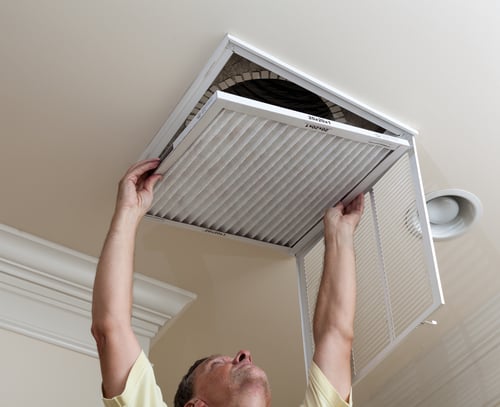Your air filter is a small and slight object that has a big impact on your home’s energy efficiency, so it’s important to get to know your air filter.
- Why Air Filters? Air filters protect your heating and air conditioning equipment from dust and dirt, while providing your home with fresh, clean air.
- Where is my Air Filter? The air filter is located either next to your furnace or the air conditioning system’s air handler. If your home has multiple HVAC systems, be sure to check each air handler and return.
- One Size Does Not Fit All Air filters come in a multitude of sizes and types. You need to know exactly what size and type of filter your air conditioner uses—some might be standard (1-, 2-, 4- and 6-inch widths) or sometimes custom sizes.
- Dirty Air Filters = Broken Air Conditioner If you don’t change your air filter on a regular basis, you could end up paying more in the end when your air conditioner needs replaced. Yep, that flimsy air filter can take down your metal monster of an air conditioner because when an air filter is dirty, airflow is restricted. That restriction places additional strain to the air handler fan motor, causing it to burn out, overheat and fail.
- What’s a MERV? MERV stands for Minimum Efficiency Rating Value, which is the industry standard for air filters. The lowest efficiency starts at 1 and goes to the highest, 16, grading how effective the air filter is a capturing dust and holding it.
- Bigger Doesn’t Always Mean Better Knowing that the highest MERV rating is 16, don’t go out buying only 16s—not all air filters are made for all air conditioners, and the highest-rated filter might actually restrict airflow. Again, know your air conditioner and its requirements to ensure you purchase the best fitting filter for the best performance.
- Can’t I Just Vacuum It? Disposable air filters are disposable for a reason—trying to vacuum the filter will only loosen and release the dirt and dust (and toxins, ew) from the filter and turn them loose in your home. Trying to wash the filter will not only damage it, but it won’t be able to dry well enough, causing mold and bacteria to grow (again, ew).
- Think Three Keep on track by checking and changing your air filter every three months, or four times a year.
Got questions or need advice on your air filter? Contact Heat Relief today!

